
Pop is the ninth studio album by Irish rock band U2. It was produced by Flood, Howie B, and Steve Osborne, and was released on 3 March 1997 on Island Records. The album was a continuation of the band's 1990s musical reinvention, as they incorporated alternative rock, techno, dance, and electronica influences into their sound. Pop employed a variety of production techniques that were relatively new to U2, including sampling, loops, programmed drum machines, and sequencing.
A mashup is a creative work, usually a song, created by blending two or more pre-recorded songs, typically by superimposing the vocal track of one song seamlessly over the instrumental track of another and changing the tempo and key where necessary. Such works are considered "transformative" of original content and in the United States they may find protection from copyright claims under the "fair use" doctrine of copyright law.
Ivy was an American indie pop band composed of Andy Chase, Adam Schlesinger, and Dominique Durand. They were active between 1994 and 2012.

Pop Will Eat Itself are an English alternative rock band formed in 1986 in Stourbridge in the West Midlands of England with members from Birmingham, Coventry and the Black Country. Initially known as a grebo act, they changed style to incorporate sample-driven indie and industrial rock. Graham Crabb describes their sound as "electronic, punk, alternative hip-hop, hybrid music for fucking, fighting & smoking cigars". Their highest-charting single was the 1993 top-ten hit "Get the Girl! Kill the Baddies!". After initially disbanding in 1996, and having a brief reformation in 2005, they issued their first release in more than five years in 2010.

The Golden Section is a 1983 album by English musician John Foxx. A progression from the sound of The Garden (1981), Foxx called The Golden Section "a roots check: Beatles, Church music, Psychedelia, The Shadows, The Floyd, The Velvets, Roy Orbison, Kraftwerk, and cheap pre-electro Europop". The album was Foxx's first work with a producer since his final Ultravox album, Systems of Romance, in 1978; The Golden Section was co-produced by Zeus B. Held, well known in the Krautrock scene of the 1970s. In addition to Foxx's wide array of synthesizers, the production made extensive use of vocoder effects and sampling, along with traditional rock guitar.
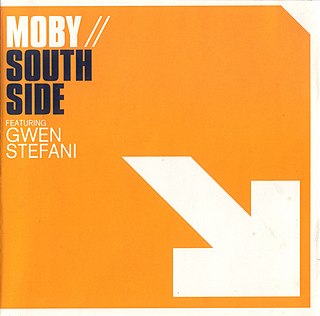
"South Side" is a song written and recorded by American electronica musician Moby. It was released to radio on October 10, 2000, as the seventh single from his fifth studio album, Play. Initially recorded with No Doubt frontwoman Gwen Stefani, production problems forced Moby to leave Stefani's vocals off the mix of the song included on Play; Stefani's vocals were then restored for the song's single release. The drums are sampled from "What's Up Front That Counts" by the Counts.
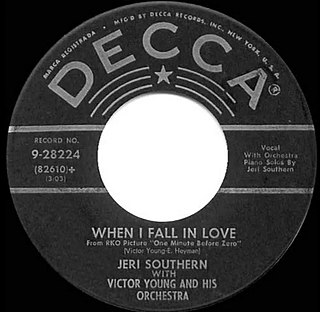
"When I Fall in Love" is a popular song, written by Victor Young (music) and Edward Heyman (lyrics). It was introduced in Howard Hughes' last film One Minute to Zero as the instrumental titled "Theme from One Minute to Zero". Jeri Southern sang on the first vocal recording released in April 1952 with the song's composer, Victor Young, handling the arranging and conducting duties. The song has become a standard, with many artists recording it; the first hit version was sung by Doris Day released in July 1952.
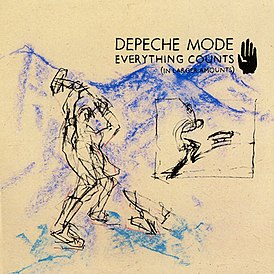
"Everything Counts" is a song by the English electronic music band Depeche Mode from their third studio album, Construction Time Again (1983). A live version of the song was released in 1989 to support the band's live album 101. The original single reached No. 6 on the UK Singles Chart, whereas the live version reached No. 22.

"Let's Go to Bed" is a song by English rock band the Cure, released as a stand-alone single by Fiction Records in November 1982. In the aftermath of the dark Pornography, Robert Smith returned from a month-long detox in the Lake District to write the song, the antithesis to what the Cure currently represented. It was later included on the album Japanese Whispers, which compiles the band's three singles from 1982 to 1983 and their five B-sides.

"What Time Is Love?" is a song released, in different mixes, as a series of singles by the British electronic music band the KLF. It featured prominently and repeatedly in their output from 1988 to 1992 and, under the moniker of 2K, in 1997. In its original form, the track was an instrumental electronic dance anthem; subsequent reworkings, with vocals and additional instrumentation, yielded the international hit singles "What Time Is Love? " (1990), and "America: What Time Is Love?" (1991), which respectively reached number five and number four on the UK Singles Chart, and introduced the KLF to a mainstream international audience.

"Black Sunshine" is a song initially featured on the album La Sexorcisto: Devil Music Volume One by White Zombie which was used as a promo single in 1992 and 1993. The song can also be found on Rob Zombie's Past, Present & Future and the greatest hits album The Best of Rob Zombie. A spoken word section was recorded by Iggy Pop for the intro and was used in the song's final cut.

"Kiss Them for Me" is a song written and recorded by English rock band Siouxsie and the Banshees. It was produced by Stephen Hague. It was released in 1991 as the first single from the band's 10th studio album, Superstition.

This Is the Day...This Is the Hour...This Is This! is the second studio album by English rock band Pop Will Eat Itself, released on 1 May 1989 by RCA Records. It builds upon the band's 1987 debut Box Frenzy in its extensive usage of sampling, combining influences from punk rock, hip hop, heavy metal, and disco music, with samples and lyrics that reference, among many subjects, pop culture and otaku culture. Particularly influential on the album's musical style were hip hop group Public Enemy, while the album's own subtle post-punk touches would later be credited as influential. Some critics regard it as a sound collage. The album artwork, designed by The Designer's Republic, touches on nuclear warfare themes.

Box Frenzy is the debut studio album by English rock band Pop Will Eat Itself. It was released on 26 October 1987 in the United Kingdom by Chapter 22 Records and in the United States by Rough Trade Records.
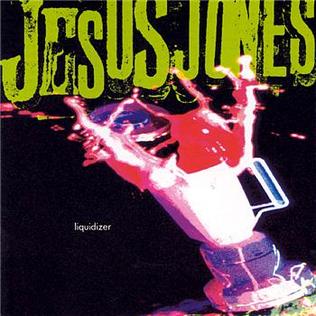
Liquidizer is the debut album by British rock band Jesus Jones, released in October 1989 through Food Records. After various line-up changes, the members of the band moved to London, where frontman Mike Edwards would diversify his musical tastes. Guitarist Jerry de Borg joined soon after; in May 1988, Edwards acquired a sampler which would further his songwriting. With the addition of keyboardist Iain Baker, the band signed to Food Records by the end of the year. Initially enthusiastic about working with producer David Motion, recording sessions with him were fruitless. Craig Leon then produced Liquidizer in mid-1989, helping to give the album its signature tone, though the members would later be disappointed by the mixing.
"Def. Con. One" is a single by Pop Will Eat Itself released in July 1988 from the album This Is the Day...This Is the Hour...This Is This!. The single reached #63 in the UK Singles chart.
"Wise Up! Sucker" is a single by Pop Will Eat Itself released in 1989 from the album This Is the Day...This Is the Hour...This Is This! The single peaked on the UK Singles Chart at #41.
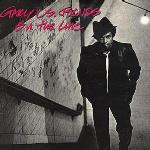
On the Line is an album released by Gary U.S. Bonds in 1982, the second of two on which he collaborated with Bruce Springsteen & the E Street Band, the first being Dedication, released the previous year, 1981.
"Beaver Patrol" is a single released by the band Pop Will Eat Itself in 1987. It appears on the album Box Frenzy in a slightly edited version. The song was originally recorded by the sixties band The Wilde Knights.
"I Found Lovin'" is a song first released by the Fatback Band in 1983 by Master Mix Records. Co-written by long-time Fatback Band bassist Johnny Flippin and then-new singer/keyboardist Michael Walker, "I Found Lovin'" was included on the group's album With Love.













